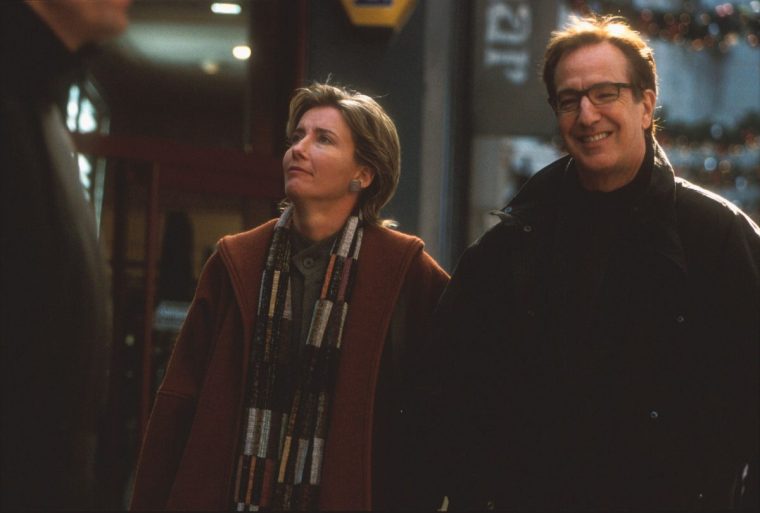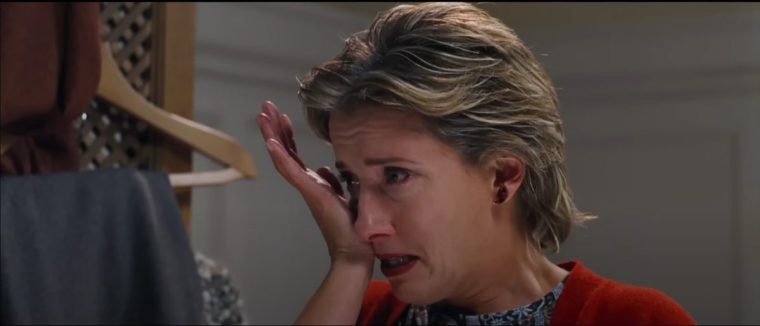“River” is the Joni Mitchell song everyone plays at Christmas. Its mournful echoes of “Jingle Bells”, its outpouring of heartbreak and regret, “Oh I wish I had a river I could skate away on.” It is far from the jolly, spirited bonanzas of Mariah Carey and Shakin’ Stevens and articulates instead the truer, trickier feeling of being left behind when the rest of the world is united in joy.
But there’s another of her songs that has grown to represent Christmas, too. “Both Sides, Now”, released when she was 23 and re-recorded in her late fifties when age and cigarettes and adulthood had hewn her voice into something wiser, aching and new, will forever recall Christmas because it soundtracks Emma Thompson’s devastation in 2003’s Love Actually.
Love Actually is a ridiculous film. It’s embarrassingly twee, the script is regularly absurd, it depicts a London completely foreign to anyone who has been, let alone lived there, it panders unforgivably to an American audience, it has not exactly dated brilliantly on the diversity front, it is totally saccharine and shameless in extracting emotion from the viewer every three minutes via one of its many ludicrous trysts.
I write this with affection, because I have watched it about 40 times and will continue to adore it no matter how “problematic” it is. Well done, I say, to that smug chorus reminding me annually “it’s not that good”. It’s a Richard Curtis rom com in which we are engineered to swoon at prime minister Hugh Grant dancing through 10 Downing Street to The Poynter Sisters and snogging his staffer at a school carol concert. What were you expecting?

But amid all the schmaltz and white-walled houses and posh people saying “chubby”, amid the cartoonish caricatures – Liam Neeson the widower falling in love with Claudia Schiffer; Martin Freeman and Joanna Page the furtive porn stars; Bill Nighy the “old ex-heroin addict searching for a comeback at any price”; Colin Firth playing Mark or Mr Darcy again – Thompson delivers something truly powerful. Her quiet vignette of a marriage, of broken trust and family and betrayal, is the film’s emotional climax and core.
Thompson’s Karen is resilient, good-humoured, devoted, unfazed – a middle-class mother with whom you immediately connect, who spends much of the film doing her husband Harry’s (Alan Rickman) Christmas shopping for him and dutifully accompanying him to his office party. She loves Joni Mitchell – “and true love lasts a lifetime”. On the night of the school Nativity, she allows her children – Bernie, her “horrid son” and Daisy, who is playing “First Lobster” in the show – to open one present each.
When it is “Mummy’s turn”, Joni Mitchell’s orchestra swells as she opens a “special” gift from Harry and discovers not the gold necklace she’d seen in his coat pocket – and which she immediately realises has gone to another woman – but a Joni Mitchell CD in a painted cardboard box.
He beams gormlessly on, pleased with himself; she calmly leaves the room for a wordless, two-minute undoing that leaves me breathless with despair, no matter how many times I watch it. She stands in their bedroom, in her big red cardigan, presses her tears into her eyes with the heel of her hands and stares into space in panic, knowing she is his “cold English wife” whom Joni Mitchell taught to feel, and he desires someone else. She smooths down the blanket on the bed, breathes, and marches back into the hallway. “It’s love’s illusions that I recall/ I really don’t know love/ I really don’t know love at all”.

Thompson’s sparse performance is a masterpiece. She beautifully renders that gutting brokenness of a suspicion confirmed; we understand, deeply, the duty she feels to contain her emotions for the sake of everyone else – when she leaves the bedroom she returns to mum mode, and marvels that her children already have their coats on. It is an unbearably acute reminder in a film otherwise all about romance of the pain of real relationships, and that true love might not always last a lifetime. As she puts it, succinctly, when she confronts him: “You’ve made a fool out of me. You’ve made the life I lead foolish too.”
At this time of year we cling to tradition and family and comfort to insulate ourselves from change and reality. But the snow globe can always be shaken up. What unites everything I rewatch at Christmas is an acknowledgement that while the world might seem full of festive cheer, through the crackers and the carols and the comedy there is always the uncertainty of real life and the future poking through.
The Office Christmas Special was only so poignant because of the tragedy of David Brent’s fall from grace. The Royle Family‘s only so moving because of bone idle Denise’s terror about growing up, as she goes into labour on the bathroom floor. Gavin and Stacey’s first special, in 2008, is only a modern classic because it unites these families and their ordinary but great sadnesses – Smithy’s baby son growing up far away from him, Pam and Mick’s grown-up son moving away from home. The Snowman, without a script, reminds us that no Christmas fantasy can last for ever.
Christmas-by-numbers Netflix movies and disposable, tinselly sitcoms try to capture the spirit of the season with love stories and twinkly lights. But those happy endings never move us unless, like Emma Thompson’s, they first look at love from both sides and are still able to shine through the dark.


'President Musk' is flexing his muscles and revealing how weak Trump is